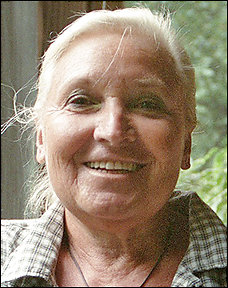(WP) – Thanks to chance and circumstance — because people left them, sent them, lent them — a trio of autobiographies landed on my desk last weekend: Valerie Plame‘s “Fair Game: My Life as a Spy, My Betrayal by the White House,” George Tenet‘s “At the Center of the Storm: My Years at the CIA” and Peter Gay’s “My German Question: Growing Up in Nazi Berlin.” Though Plame and Tenet were published in 2007 and Gay in 1998, I hadn’t read any of them.
Monique De Wael
Motivation to pick them up was, however, provided by Margaret B. Jones and Misha Defonseca. For those who missed their stories, Jones, a half-white, half-Native American drug-dealing gang member who grew up in foster homes, according to her well-received memoir, last week turned out to be Margaret Seltzer, a white suburbanite who grew up with her family. Defonseca, a Jew who survived the Holocaust by living with wolves, according to her acclaimed autobiography, is now revealed to be Monique De Wael, a Catholic who spent the war in Brussels.
The two revelations — coming in the wake of J.T. Leroy, James Frey, Binjamin Wilkomirski and other hoaxes — inspired much criticism of the publishing industry (Why do they fall for it? Why don’t they fact-check?) and some excellent parodies (see Slate’s ” advertisement” for Margaret B. Jones, Volume II: “She brought down Senator Joseph McCarthy, founded the Black Panthers and wrote Ronald Reagan‘s Berlin Wall speech — all before taking over the notorious Crips gang in South Central . . .”).
But maybe these extreme examples should inspire some other questions, too. How “true,” for example, are real autobiographies, written by real people, describing real events? Coincidentally, I was first taught to ask this question by Peter Gay himself, now an emeritus professor of history, during a seminar on autobiography that he taught 20-odd years ago. As I recall (if I recall correctly!), we were debating Rousseau’s “Confessions” when Gay pointed out some element of the story that could not possibly have been true. He then invited us to think about why, in that case, Rousseau had changed it. For unconscious emotional reasons? Or consciously, to shape his reputation?
Reading Gay’s own idiosyncratic autobiography, it’s evident that he had such historical uses and abuses of autobiography in mind while he was writing. During his account of growing up in and emigrating from 1930s Berlin, he frequently questions both his recollections and his motives for recording them. He confesses to prejudices, most notably a hatred for the Nazi regime, which might color his account of his pre-Nazi early childhood. He admits to important gaps in his memory.
By contrast, Tenet and Plame’s books show no such hesitations, no such uncertainties and certainly do not admit to prejudice. Tenet does concede that “no such undertaking is completely objective” but calls his book “as honest and as unvarnished as I could make it.” Plame doesn’t even go that far, offering instead, by way of introduction, a rollicking account of her CIA recruitment (and, bizarrely, a sizable number of irrelevant childhood photographs).
I have no intention of picking on Tenet and Plame, much as they might deserve it, just because I stumbled upon their books last weekend. After all, what struck me about their memoirs was not their uniqueness but their similarity to other books in the “political memoir” genre, recent examples of which include the autobiographies of both Clintons; “Leadership,” by Rudy Giuliani; “No Retreat, No Surrender,” by Tom DeLay; and “The Audacity of Hope,” by Barack Obama (but not his first, quirky, pre-fame book, “Dreams From My Father”), to arbitrarily name a few.
Beyond “setting the record straight,” none of these books was ever intended to have deeper literary or historical significance. They don’t do careful self-analysis, but neither do they add much to the bigger picture. They don’t necessarily “lie,” but they are intended to shape public perceptions of the authors, which is why many read like extended versions of those candidate life-story films one sees nowadays at political conventions. Some — I’m thinking here of Bill Clinton‘s hefty memoir— seem designed to decorate coffee tables, not to be read at all.
So why don’t the publishers who produce them come in for more criticism? And why aren’t they, like Margaret B. Jones, more often parodied? (“He achieved peace in Northern Ireland, fixed the American health-care crisis and single-handedly dismantled the New York City trash collection mafia — all the while remaining a perfect husband and father and never accepting a single penny from lobbyists. . .”)
Or maybe the publishing industry shouldn’t get all of the blame. We’ve all gotten used to the idea that life stories can be “sold”; that lives that contain accidents, deviations and inexplicable moments of uncertainty, as all lives do, can be crafted, shaped and presented to the public by marketing specialists — and yet remain “true.” No wonder we’re so easily taken in, nowadays, by fraudsters, hucksters, fake drug dealers and, of course, people who claim to have been raised by wolves.
